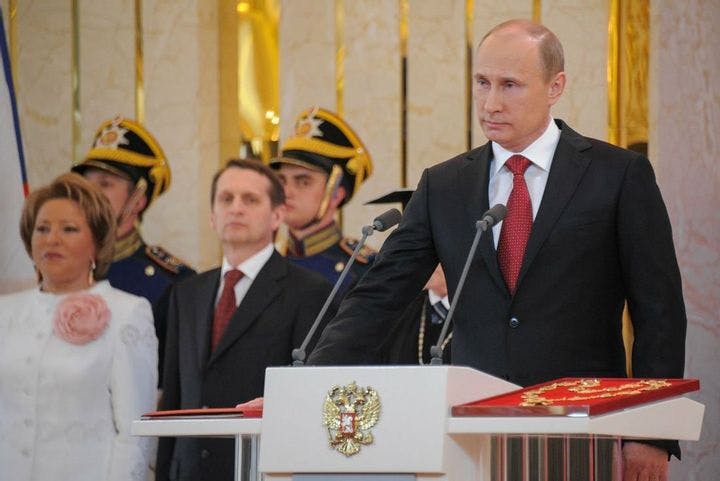Fall 2012
Putin's Tomb
– The Wilson Quarterly
By manipulating elections, Putin managed to conceal his regime’s deepest secret—namely, that rather than being misgoverned, Russia is governed very laxly if at all.
Add to borsht, vodka, and imposing fur hats another quintessential feature of Russian life: rigged elections. Vladimir Putin returned to the presidency of the Russian Federation in March after four years of running things from behind the scenes as prime minister, retaking Russia’s highest elected office on the strength of balloting that international observers condemned as fraudulent. Russians staged large, vigorous protests in Moscow, St. Petersburg, and other Russian cities following unfair parliamentary elections and Putin’s announcement of his presidential bid, but he remains popular among much of the electorate. “Why has Putin regularly rigged presidential elections when he has been well positioned to win them even if the competition were free and fair?” ask Ivan Krastev, the chairman of the Center for Liberal Strategies in Sofia, Bulgaria, and Stephen Holmes, a law professor at the New York University School of Law. “And why did the Kremlin rig elections in a manner so flagrant that nobody could doubt that they were rigged?”
The ploy, Krastev and Holmes say, is intentional: Fixed elections were the “central, load-bearing institutional pillar” of Putin’s regime during his first two terms as president, from 1999 to 2008. They delivered four crucial results.
First, by permitting only inept and out-of-touch competitors to appear on the ballot in the 1999 and 2003 elections, the Kremlin bolstered the sentiment among Russians that even if the final tallies hadn’t been falsified, Putin still would have won.
Second, the elections were convenient loyalty tests for the Kremlin. If regional elites couldn’t produce high turnouts for Putin or his party, they would be replaced by people who could.
Third, Putin’s lopsided electoral victories served to showcase “Russia’s national unity and to dramatize the imagined coherence and solidarity of Putin’s nation,” a unity many Russians yearned for in the wake of the disorienting breakup of the Soviet Union.
Finally, rigged elections were an easy way to display power. “It is certainly easier to engineer elections than to build roads or socialize the Chechen youth,” the authors remark. By brazenly manipulating elections, “Putin managed to conceal his regime’s deepest secret—namely, that rather than being misgoverned, Russia is governed very laxly if at all.”
The secret’s out now, however. Putin has “trashed the very idea” of a democratic future for Russia, Krastev and Holmes say. And Western-oriented Russians, who once held out for that possibility, seem prepared to dig in for a longer fight against him.
THE SOURCE: “An Autopsy of Managed Democracy” by Ivan Krastev and Stephen Holmes, in Journal of Democracy, July 2012.
Photo courtesy of The Kremlin
